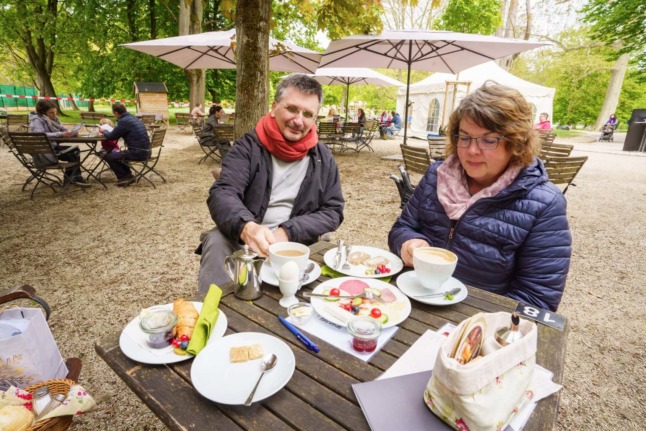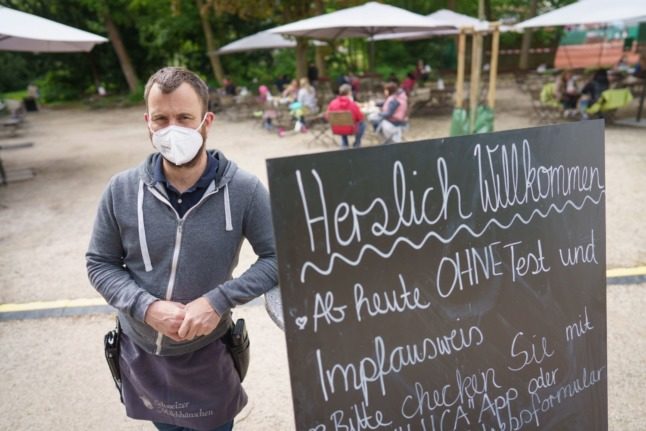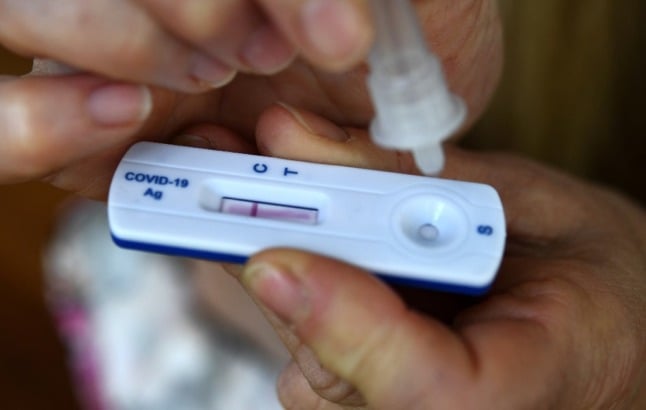The rules on outdoor dining are set by the individual states, meaning the rules are subtly different in the various parts of the country.
Keep in mind that national rules prescribe that fully vaccinated people, and those who’ve recovered from Covid (within a certain time frame), do not have to show a negative Covid-19 test when tests are mandatory. They can show proof of their immunity.
READ ALSO: How do you prove you’ve been vaccinated or have recovered from Covid-19?
Here’s a look at the situation across a handful of German states.
Hamburg
In Hamburg, which currently has a 7-day incidence of around 43 cases per 100,000 inhabitants, the city has allowed restaurants to open up their outdoor dining areas starting on the Pentecost weekend.
Hamburg mayor Peter Tschentscher said that the city would not impose a test requirement on restaurants as the incidence rate is below 50, and he said there was only a low risk of being infected with the coronavirus outdoors.
In the port city only a maximum of five people from two households can sit at a table together.
Much like last summer, guests will have to leave their details with the restaurant for contact tracing purposes.
READ ALSO: Hamburg to open restaurants earlier than planned as incidence drops below 50 mark
Schleswig-Holstein
The northern state has some of the most relaxed rules on outdoor dining. Up to 10 people can sit at a table and there is no limit based on households.
Children younger than 14 plus fully vaccinated people and those who’ve had the virus in the past half year can also sit at the table.
Guests sitting outside don’t need to provide a negative test result.
READ MORE: Where in Europe are Covid curfews and early closures still in place?
Berlin and Brandenburg
In Berlin, where restaurants, cafes and bars can open up outdoors starting on Friday, diners will have to provide a negative test result from the last 24 hours, or must show that they have been fully vaccinated or recovered from the virus.
In Brandenburg, where restaurants are also opening up for Pentecost, guests need to provide a negative test result if they are not fully vaccinated.
Corona-Maßnahmen vor Pfingsten in Brandenburg gelockert https://t.co/ckUCUGb7vH pic.twitter.com/7RAWTEX9eK
— Berliner Morgenpost (@morgenpost) May 21, 2021
A restaurant in Brandenburg prepares on Friday morning to welcome guests again.
READ ALSO: How you can visit a bar in Berlin from Friday
Bavaria
Things are a bit complicated in Bavaria.
In districts with a 7-day incidence between 50 and 100 you don’t need to show a negative test result if you only sit with your own household.
But meetings with a second household mean that a test result is required. For an antigen test the result needs to be no more than 24 hours old. For a PCR test it can be up to 48 hours old.
At an incidence lower than 50 guests don’t need to provide a negative test result. Between an incidence of 35 and 50 only two households and a maximum of five people can sit at one table. Below an incidence of 35, three households and a maximum of 10 people can sit at one table.
North Rhine-Westphalia
In North Rhine-Westphalia non-vaccinated guests at restaurants will have to provide a negative test that was conducted in the past 48 hours. This can be a PCR test or an antigen test, but the antigen test needs to have been done in a test centre or at a pharmacy – not a self administered test.
Hesse
In the central German state of Hesse restaurants that open for outdoor dining need to ask non-vaccinated and recovered guests to provide a negative test result. All guests have to give their details for contact tracing.

Guests already made a reservation for breakfast at a restaurant in Bad Nauheim, Hesse on Friday morning to mark the reopening of outdoor dining. Photo: picture alliance/dpa | Frank Rumpenhorst
READ MORE: Outdoor dining and swimming pools: How Berlin plans to reopen in May
Saxony
As of Wednesday, restaurants in the eastern state have been allowed to reopen outside, with guests requiring a negative test from the past 24 hours. The inside areas can also reopen once there is a 7-day incidence of under 50 for five days in a row.
Saarland
Restaurants and cafes will be allowed to reopen indoors starting on May 31st to guests with a negative test. In districts of the French border state with a 7-day incidence under 100, outdoor dining is already open. The state became well known around the Easter holidays for the ‘Saarland model’, which allowed for mass openings when this figure was reached.
Bremen
On Tuesday, the harbour city-state senate decided that restaurants and bars would be allowed to reopen their outdoor seating areas on Friday.
Guests will be allowed until 11 pm, as long as they have a negative coronavirus test from the same day. But as soon as the 7-day incidence drops below 50, this is no longer required. Guests are – and will remain – required to register via an app, such as luca.
Saxony-Anhalt
Starting on Tuesday, indoor dining can open in cities or counties with a 7-day incidence of under 100 for five days in a row. As with elsewhere, strict hygiene rules will apply, such as mask wearing and showing a negative test.



 Please whitelist us to continue reading.
Please whitelist us to continue reading.
Member comments